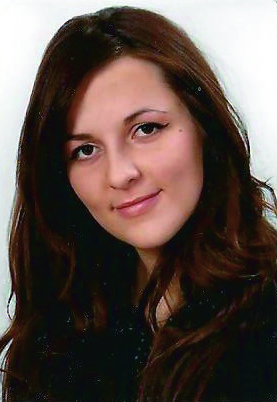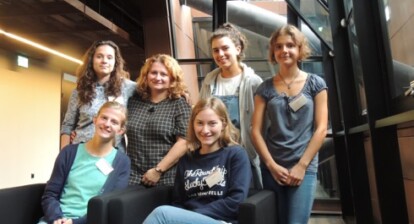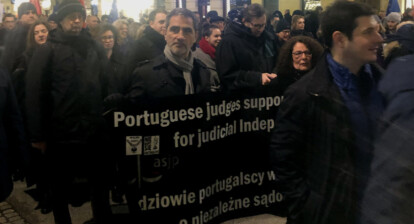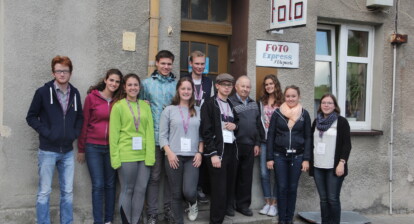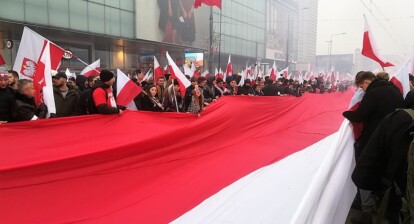Born in 1993, Kraków, Poland
High school graduate, future Inter-Faculty Individual Studies in the Humanities student (Jagiellonian University)
Topic of the 2011/2012 Polish History Competition: Poles and Russians in the 20th Century – Recorded and Effaced Stories
Estera’s Research Topic: „A farewell to Poland, a farewell to Russia. The history of three Polish-Russian marriages.” (2011)
Part 1 – Summary
I wrote the story of three Polish-Russian marriages in the 20th century: Luba and Czeslaw £otarewicz, Larysa and Peter Kaczmarczyk, Catherine and George Sendeckij.
Czeslaw £otarewicz, a Pole, was a soldier in the Home Army, the dominant Polish resistance movement in occupied Poland during World War II. He was imprisoned in 1944 and sentenced to serve 25 years in the camps in Siberia. In prison in Moscow he met a young Russian woman – Luba – who worked on a farm nearby the prison. She helped the prisoners, bringing them food. After a short stay in Moscow prison, Mr. £otarewicz was sent to Norilsk, from where he wrote letters to his beloved Luba. Soon after that, she decided to go to Norilsk and spend the rest of her life with him. In 1956, three years after Stalin’s death, Mr. £otarewicz attempted to return to Poland, which he managed to do in 1957.
Larysa Kaczmarczyk, a Russian, lived in Baku (former USSR, now Azerbaijan). She met her future husband at the party of a friend who had Polish roots. During their joint stay in the Soviet Union they had a civil marriage ceremony. Mrs Kaczmarczyk soon moved to Poland. As an open-minded woman, she quickly adapted in Krakow. She is an exception to the background of the situation of 60’s and 70’s. Her example proves that as a Russian living in Poland, you can receive a lot of kindness.
George Sendeckij, my father, was born in Magnitogorsk – a city in which Poles came to participate in the construction of Steel Mill 2000 during the time from 1980 to 1990. Among the Poles was also Marian Trzcionka – the father of Catherine Trzcionka. Soon, mainly through barter trade that took place between the Poles and the inhabitants of Magnitogorsk, George, as a young doctor, was invited by Marian to Kraków, where George and Catherine met. After several years of correspondence and mutual visits they decided to get married and live in Poland. My father was initially subjected to discrimination and prejudice from Catherine’s family and friends, his employers, and even strangers because of his nationality. As time passed and George improved his Polish language, the differences blurred, and simultaneously the manifestations of Polish-Russian resentment were slowly disappearing. His story depicts the attitude of Poles toward Russians after 1989.
The above examples show that the political relations on Moscow-Warsaw arena could but didn’t necessarily have an impact on relationships between civilians. For instance, during the war human misery, which has no nationality, was more important that winning. That’s why Luba helped prisoners no matter where they came from. Ironically, in the time of peace there were more resentments and even antipathy towards the Russians in Poland. For the past two years, because of the Smoleñsk catastrophe (the air crash in which Poland’s first couple, the country’s top military commanders and leading politicians had crashed fatally in Russia while heading to the 70th anniversary ceremony of the Katyñ), relations had been really tense. But still, there is hope that lays in the wisdom of our politicians and the electorate that they will find a brand new way to understanding.
Part 2
I am the daughter of a Polish woman, Catherine Sendeckij (nee Trzcionka) and a Russian man, George Sendeckij. So, due to my personal situation I found the 2011/2012 years’ topic compelling. Since my childhood I have lived in a multicultural home, where the air smells of borderland, Russian and Polish cuisine mingled, and Mickiewicz stood on one shelf with Pushkin.
Before writing the story for the “History at Hand” Competition I realised that there was very little that I knew about the youth of my parents. I thought that the contest may be a good argument to “push” them to tell me more detailed stories. After a few loose conversations with my parents and grandparents I came to the conclusion that picturing the problem of Polish-Russian marriages in a broader timeline could be an interesting topic. It was truly “History at Hand” – because whose story is closer to us than our own? Regardless of my personal situation, the topic of mixed marriages is absorbing in itself, and due to the opening of borders, a united Europe and multiculturalism, which is ubiquitous in today’s world, it is an extremely up-to-date topic as well.

